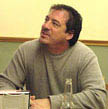 |
P.O.V.'s Borders visitors sent Dagoberto
Gilb these questions in response to his work and his
answers to P.O.V.'s initial 6 Questions. Read on!
Question: How and when did you decide to become a writer? What
was the hardest part about "crossing over" into a world
of letters versus a world of carpentry and construction? How do
you begin a story and how faithful are you to events in your life?
Do you start from a documentary place then move into fiction or
do you just create from the beginning?
Dagoberto: Writing is a permanent flu — it hits you, you have
no control of it. Its symptoms are: Light-headed, feverish daydreaming
about writing while at a paying job that you get fired from; gut-wrenching
dread of having a worthless, unemployable life while writing one
paragraph in two hours for a piece that you may (or may not if it's
lousy, which it often is), after you have lots and lots and lots
of paragraphs, a hundred or two dollars; finally, and even worse,
a hallucinogenic-like bloodrush when something you have written
is accepted — this delusional exhilaration can affect personality
for many troubled years, even when the only other person to have
read it and believed in you and this work, momentarily, was your
one and only love (not even your mom will have been impressed),
the one you shouldn't have let get away, but she now dismisses you
because you're such a financial loser.
I never crossed it, it crossed me. I was a carpenter who wrote.
I read and loved stories and books. I loved getting to go to college
— I loved learning what I didn't know — so much I didn't
know! (Still don't, but you can't BELIEVE how much I didn't know
before) (or maybe you can.)
I write fiction. Fiction is more "faithful" to "real"
events than "reality." Fiction is like myth — more true.
It is like poetry — focus on the small to describe the large. I write
fiction to try to transcribe, descriptively, that which has no specific
word or sound. Fiction is a form of sign language, and once you
get used to it, you love signing with others who know it. It's also,
therefore, very quiet, as you see, so nobody screams at you for
getting carried away by it, like, eg, peoples who like, say, plays
drums in a rock band.
Question: Mr. Gilb, as communities and cultures continue to merge
and blend, what advice, strategies, thoughts do you have for bi-racial
and intercultural youth trying to negotiate between the traditions
of their family and those of their new home.
Dagoberto:There is no particular answer — if there were, there'd
be a software you could load. This is an old, old story, the oldest
story, the one played out in Mexico, in the Caribbean, in Central
America, in all lands conquered by others, by those who surrendered
and those who fought back. It has played out here in the United
States: Immigrants. You know, Kentuckians of German descent who
came to Tejas, which was Mexico, and loved it so much they decided
to stay and take it and call it Texas.
Everyone of us is a country and a culture unto each other. It is
the mark of American culture. Each of us has been negotiating this
as soon as we notice consciousness. It's about power, class, and
color ("Ay, ¡que chulo!"). We do know the game.
It is played and played as much as a video game: You learn to play
with your own skills. Are you a priest, a warrior, a businessman,
a teacher, a muscian, an artist, a plumber, a writer, an engineer,
a doctor...? The best weapon is to work harder, do more, be better.
Be proud when the time comes. Be humble and be generous. But don't
take any guff (no pedo).
Question: I was wondering if you could elaborate
on your hatred of the gender slash (chicano/a). Do you not think
this difference is important, or that it serves a purpose? Unity,
solidarity and equality are noble goals, but do you honestly think
that distinctions, such as gender, are always bad. Can't people
cooperate while remaining on different sides of a border?
Dagoberto: It's that I hate freaking Stalinist bureacrat jargon,
like being forced to join a political party (right or left?), so
no me gusta the slash thing, even as I say (though I am not allowed
to, probably) I understand the issue it underlies. So yeah, go ahead,
whack me with it now. Whack me with that big stick. Smack smack.
I'm cowering, taking my lashing. I will say, my back exposed, watching
you, it sure looks like trouble to carry around, makes you look...
well, it just ain't enough, is it? And don't it make into caricature
what's, otherwise, a valuable subject? It's obviously about me,
not as an individual, but about my hormones and genes, and what
can I do about it now? But I hate to say it but it doesn't really
hurt that much, I'm sorry. So go on, whack and smack. Isn't it hard
to go to cool parties, meet someone you like, and — since it's
always there at your side — I'm sure then you have to discuss
it? What a drag it must be to carry it around when you step out
to eat, having to check it at the door, not forget it like an umbrella.
I forget those all the time! It just doesn't look very fun. I suppose
probably I'm just too dumb, those juicy hormones of mine making
me too burpy drunk. So sorry. But hey, I'm telling you, I give up,
I surrender — I am a Chicana writer, I surrender my O, you
win. Can't that be enough?? Just tell me what I gotta do.
|
 |
 |


![]()






